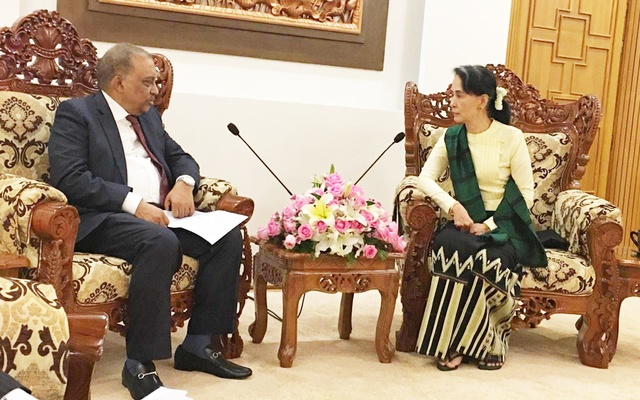China Overtakes India In Bringing About Bangladesh-Myanmar Rapprochement
P.K. BALACHANDRAN

COLOMBO: India, the South Asian regional power, appears to have lost ground to extra-regional power China, in efforts to bring about a solution to the Rohingya issue between Bangladesh and Myanmar.
Confusion over interests and delays in decision making appear to have resulted in India’s losing the initiative to China, which has taken the lead in the matter.
As a result, China could gain ground in both Bangladesh and Myanmar at India’s expense.
China and India both have vital economic and strategic interests in Bangladesh and Myanmar.
Unlike India, which sent relief to Rohingya refugees but did little else to solve the basic issue which had led to the exodus from Myanmar to Bangladesh. New Delhi did not even suggest a way out. Only very recently, External Affairs Minister Sushma Swaraj said in Dhaka that the only way out is to help Myanmar develop Rakhain State economically. But the central issue is not economic backwardness but religious-cum ethnic. The Myanmarese do not accept the Rohingyas as nationals but as Bengali illegal immigrants.
India did not respond to Dhaka’s call for mediation by India and China. But China responded. It sent its Special Envoy on Asian Affairs Sun Guoxiang to Dhaka.
Apparently due to China’s efforts, Kyaw Tint Swe, Minister for the Office of the State Counselor, visited Dhaka. Following that, this week, the Bangladesh Home Minister Mohammad Asaduzzaman Khan visited Myanmar at the head of a 10-member delegation and had an hour’s discussion with Suu Kyi.
As a result of the Khan-Suu Kyi talks, a 10-point program to take back the one million Rohingyas who had fled Myanmar has been adopted.
According to the Myanmarse news portal Mizzima the bilateral agreement envisages “stopping immediately entry by Myanmar nationals into Bangladesh and repatriation of refugees at the earliest date and restoring normalcy in Rakhine Region for their resettlement”.
This is exactly what Dhaka has been wanting.
Both sides also agreed to finish by November, the formation of the Joint Working Committee, which was announced in Dhaka early in October.
On Wednesday, after Bangladesh Foreign Secretary Md Shahidul Haque met Special Envoy Sun, he told the media: “China is also concerned. They believe this is not good for this region. They want the issue to be settled peacefully. They want it to be settled bilaterally.”
The Foreign Secretary said that he updated the Chinese official, who had last visited Bangladesh in April this year. He told Sun that the total number of Rohingyas in Bangladesh has now gone up to one million.
As a result of Beijing’s mediatory efforts, Bangladesh’s Home Minister Asaduzzaman Khan Kamal, visited Myanmar visit on Wednesday and met Suu Kyi. The Myanmarese State Counselor said that her government has begun working on taking back the Rohingyas who had fled to Bangladesh.
“We are optimistic,” Foreign Secretary Shahidul Haque said when asked if the government believes the repatriation will begin anytime soon.
It is believed that active Chinese diplomatic efforts has brought about the understanding between Bangladesh and Myanmar. China has always disapproving the pointing fingers at one of the parties to the conflict. It has argued that international intervention will only complicate matters and has called for bilateral talks between Myanmar and Bangladesh to solve the issue between themselves.
China has no suggestions to give to the two countries but only wants them to thrash out the issues untrammeled by fears of international intervention.
International intervention by the West and the UN is anathema to the Myanmarese military which actually rules Myanmar. But this view is shared by Suu Kyi who looks at the Rohingyas in the same way as the military (called the Tatmadaw) does.
The threat of international intervention in the form of economic sanctions also worries Myanmar, which is just about coming out of isolation to exploit its immense natural resources for its own growth and prosperity in a highly globalized world.
The US is toughening its stand on the Rohingya issue and is contemplating targeted sanctions. The Organization of Islamic Countries (OIC) is meeting the Third Committee of the UN General Assembly which deals with human rights issues.The UN Human Rights Council is to take up the issue in November.
In a way, Bangladesh too is wary of international intervention on a wide scale as it could vitiate bilateral relations with India and China. It does not want anybody and everybody to come with relief fearing infiltration by intelligence agencies, saboteurs and Islamic radicals.
It is said that a leading Muslim organization from the UK which had made a very attractive offer was given permission to provide relief in the Cox’s Bazar refugee camps, but only to be sent back packing in a week, because its staff were radicalizing the refugees in night classes held in the camps.



